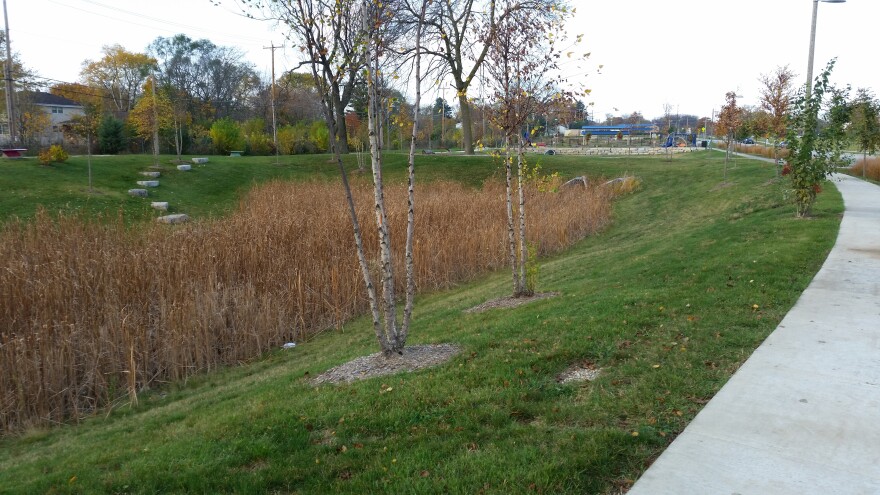Milwaukee-based startup Solar Water Works and Veolia Water Milwaukee/OptiRTC, Inc. have been selected to participate in The Water Council's Pilot Deployment Program.
The Fund for Lake Michigan and MMSD have pledged $600,000 over the next two years to fuel the program that will give the startups the opportunity to test and validate their products in the real world.
Solar Water Works' Doug Winkie designed a device to remove contaminants from water – everything from bacteria to viruses and chemicals.

Winkie’s compact creation relies on two solar panels. One generates the power needed to pump water up into the system; the other collects UV light. As the water flows over that panel, the UV light purifies it.
Winkie has spent three years developing his system and now the Water Council’s Pilot Deployment Program could catapult him closer to taking his product to market.
“In the next couple of weeks, we’re planning to get things rolling – two separate locations within the MMSD system,” Winkie says.
The Milwaukee Metropolitan Sewerage District, like utilities in many American cities, is dealing with old pipes prone to crack and break.
Sewage is ending of in pipes that are only meant to carry storm water and then makes its way untreated into surface water.
Over the next few months Winkie’s system will test the “dry weather flow." It will gauge the amount of liquid in the storm water pipes when it’s not raining - when the line should be dry.

On the Global Water Center’s 7th floor, UWM researcher Marcia Silva is making room in her lab for the students who will test Winkie’s technology.
"All of our projects have at least one industry partner that believes and invests in the project. We had 75 students last year benefited from science going on here," Silva says.
The lab will test the liquid Winkie’s system treats to measure how effectively it disinfects.
Vicki Elkin, executive director of the Fund for Lake Michigan, believes the low-cost tool could help address the problems the region’s ailing infrastructure faces.
“It takes a lot of work to figure out where that pollution is coming from and then it costs a lot of money to fix it. So if we have this system for several hundred dollars a year that treats it before it reaches our waterways, I see this as having limitless application,” Elkin says.

Elkin says the other project selected for pilot program, Veolia Water Milwaukee/OptiRTC, Inc., monitors and manages green infrastructure. The idea is to keep as much storm water as possible on site, rather than burdening the combined sewer system.
The approach uses satellite imagery. “Down to the size of a stormwater tree they can tell … whether or not the tree is healthy. In the case of a bioswale or a green roof, they’ll be able to tell you is it ponding – which means it isn’t draining right has there been plant die off,” Elkin says.

BrennonGarthwait with Veolia Water is coordinating the project. He pulls out his laptop to shows me the dashboard that breaks down conditions on a green roof. “We can see how much rain fell, how long the rain event happened, the total runoff volume,” he says.
Garthwait says Veolia is working with a Boston-based startup called OptiRTC to add alerts to the system.
“If it rains and three days later the soil moisture or the water level hasn’t changed, there’s a possibility that the outflow for the green infrastructure site isn’t working. So we can either send out maintenance staff or if it’s on private property and say ‘hey there might be an issue’ and take care of that problem before you perhaps have larger flooding….or damage on the site,” Garthwait says.
Sounds promising, but Veolia is a large international company. Why did it make the cut for the local pilot program?
“Even larger companies as they’re coming through their research and development process, it takes a lot of risk and calculated risk and analysis and because we are about business growth and economic growth in water technology, why not, why shouldn’t we offer that to them,” Elizabeth Thelen says. She is The Water Council’s director of entrepreneurship and talent.
Thelen will be meeting with both startup managers on a regular basis. “We’re checking up on milestones. We’re checking up on cash match,” she says.
The winners are required to match the grant the pilot program provides. “They have skin in the game to make it work. But we’re also saying are you doing what you said you’re doing, to actually have a product or service that’s salable at the end,” Thelen says.
Thelen thinks The Water Council has a model that works. She expects it to announce another call for applicants later this year.





